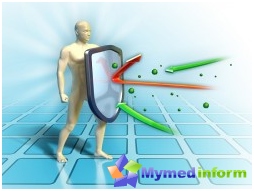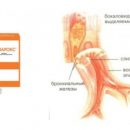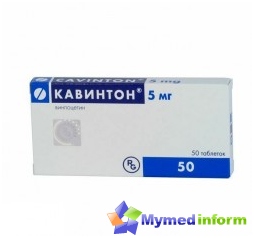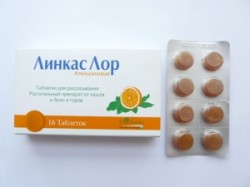Medication mechanism

Human organism reacts to various infections by developing immune reactions. This is a complex process, during which body cells interact with each other. This interaction is regulated with the help of so-called cytokines - special protein nature molecules. These molecules themselves do not affect the virus, but they are able to transmit information between cells of the body, so that our body produces an immune response to the presence of foreign antigen. Interferon is one of these cytokines.
The medicine distinguishes three types of data molecules: interferon-alpha, beta and gamma. They have some differences, but each of them to one degree or another has effects on the body, which we will tell below:
- The antiviral effect of interferon is due to the fact that they prevent the creation of RNA molecules in viral cells, and also suppress the production of proteins that are part of the outer shell of alien antigens.
- The immunomodulatory properties of interferon-based drugs are caused by the fact that these proteins regulate the interaction of the cells of the body among themselves, forcing them better to recognize the virus.
- Antitumor Action - Another feature of interferon. These substances are able to slow down or completely stop the development of cells, due to which interferon drugs have long been used as therapy during cancer. Antitumor effect of protein data is direct and indirect type. The direct effect means that the drug can affect the malignant formations directly, overwhelming their growth. The indirect effect of interferon is aimed at increasing the ability of macrophages and lymphocytes to detect alien genes in the blood and destroy them.
- Antiproliferative effect is the ability of interferon to restrain the growth of cells, thereby preventing the growth of tumors in the body. This property is that interferon molecules prevent the production of RNA and proteins in cells, and also prevent the cultivation of body tissues.
There are 2 generations of interferon-based preparations. The first generation has a natural origin, that is, this medicine is mined from donor blood. Leiccitarian dry human interferon has a form of powder that is packaged into separate ampoules. From this powder, you can subsequently do solutions for inhalation or injection into the nose. It should be noted that this method of producing the drug is considered expensive and not effective, so at the end of the twentieth century, the second generation drugs were invented. They are produced by microbiological synthesis from relatively inexpensive raw materials. Such raw materials are different strains of Pichia Pastoris bacteria, Pseudomonas Putida and Escherichia Coli.
Indications for the use of the drug

If you have any disease, do not self-medicate. Be sure to visit the doctor who, on the basis of a general inspection and necessary analyzes, will diagnose and in need of interferon. Depending on the severity of the disease, as well as on the individual characteristics of the body of the patient, the dose of the drug may differ somewhat. Below our site will result in some general recommendations about the dosage of the medicine:
- At Costood and flu accompanied Rougom, The drug is used intranasal. To prepare a solution, an ampoule with interferon is opened and 2 ml of boiled water temperature is added to it. The contents are carefully shaken until the powder is completely dissolved. 5 drops of the resulting solution are dripped at each nostril about 5 times a day. The interval between procedures should be at least 2 hours, the course of treatment is 2-3 days.
- When the first signs appear ARVI You should use interferon in the form of candles. They are introduced rectally twice a day, while the dosage of the active substance in the medicine must correspond to the patient's age.
- A good medium for the treatment of colds and influenza is considered inhalation with a solution of interferon. To do this, take 2 ampoules of the drug and dissolve their contents in 10 ml of boiled water with a temperature not higher than 37 ° C. To make inhalations, it is best to use a special device that is purchased in a pharmacy. The procedure is performed twice a day in the morning and in the evening.
As for serious diseases, then the dosage may be as follows:
- Hairy-cellular leukemia is treated with interferon, making at least 3 million per day. ME drug. The course of therapy can be from 16 to 24 weeks.
- Therapy for skin T-cell lymphoma, as well as at the sarcoma of the capos, HIV-infected people involves the use of a dose of 3-18 million. Item per day.
- In chronic myelolomicosis, a drug is prescribed in the amount of 3-9 million. May per day, the term of treatment is 2-3 months.
- Melanoma Interferon treatment is carried out for 8-12 weeks, the dose of medication is 18 million. IU three times a week.
- When hepatitis in the chronic stage, 4.5 million are prescribed. IM three times a week for a period of half a year. Treatment of hepatitis C in the first three months is carried out by a dose of the drug, component of 6 million. Me every three days. For the next three months, the amount of medication reduces half.
Contraindications and side effects from the reception of interferon

MyMedinform.Com allocated such contraindications to the use of interferon-based preparations:
- The presence of allergic reactions to interferon-alpha, chicken protein or certain types Antibiotics.
- Epilepsy, Violations in the work of the central nervous system.
- Liver diseases, kidneys, thyroid gland, non-standard treatment.
- Heavy heart disease.
- Autimmune hepatitis.
Patients taking various sedative or sleeping pills, as well as opioid nature painkillers, assign interferon with great caution.
Let's consider which side effects can have this tool to the body:
- Disorders in the work of the gastrointestinal tract: diarrhea, nausea, vomiting, loss of appetite. Occasionally there may be problems in the liver.
- Skin reactions: dermatitis, epidermis dryness, slight hair loss.
- In the process of receiving interferon, the patient may have symptoms similar to the manifestations of influenza: raising Temperature, chills, headache and muscle pain, general weakness.
- Sometimes side effects affect the cardiovascular system, the patient appears arrhythmia or decrease in blood pressure.
- In some cases, there may be impaired muscular motility, drowsiness, disturbances of consciousness.
As a rule, the use of the drug in permissible doses does not cause any side effects.









